PETER ROBERTS
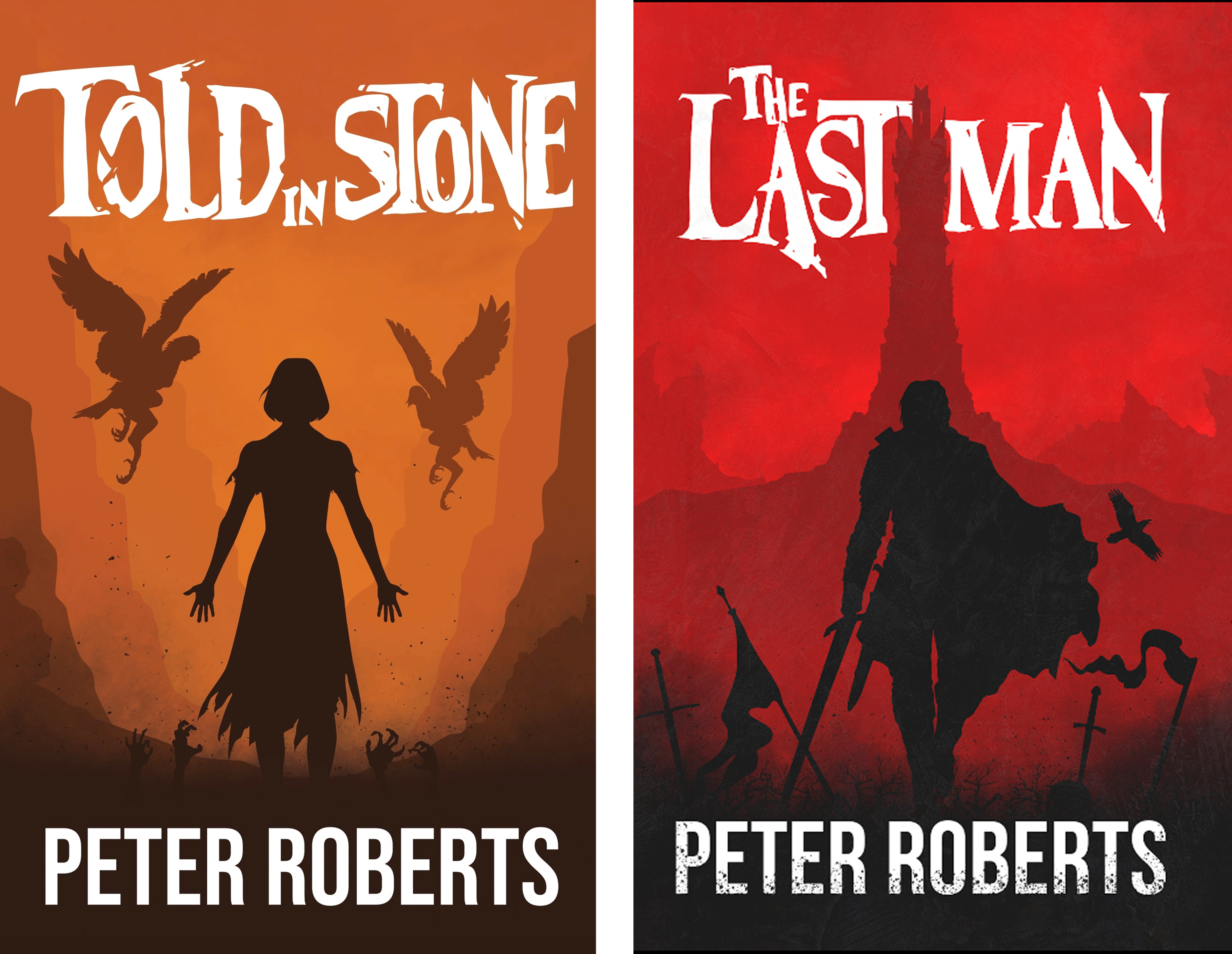
Home of The Leybound Series
The Leybound series is a gritty epic fantasy about power that must be earned, life that doesn’t play fair, and ordinary people forced to rise when the world refuses to change.The story begins with The Last Man, where survival, belief, and hard choices collide in a world shaped by forgotten histories and broken systems. It continues in Told in Stone, pushing the conflict wider as alliances strain, truths surface, and the cost of standing your ground becomes impossible to ignore.This is epic fantasy with a sharp edge: character-driven, morally complex, and built on slow-burn progression rather than easy victories.Two books are available now.
The story is only just beginning.
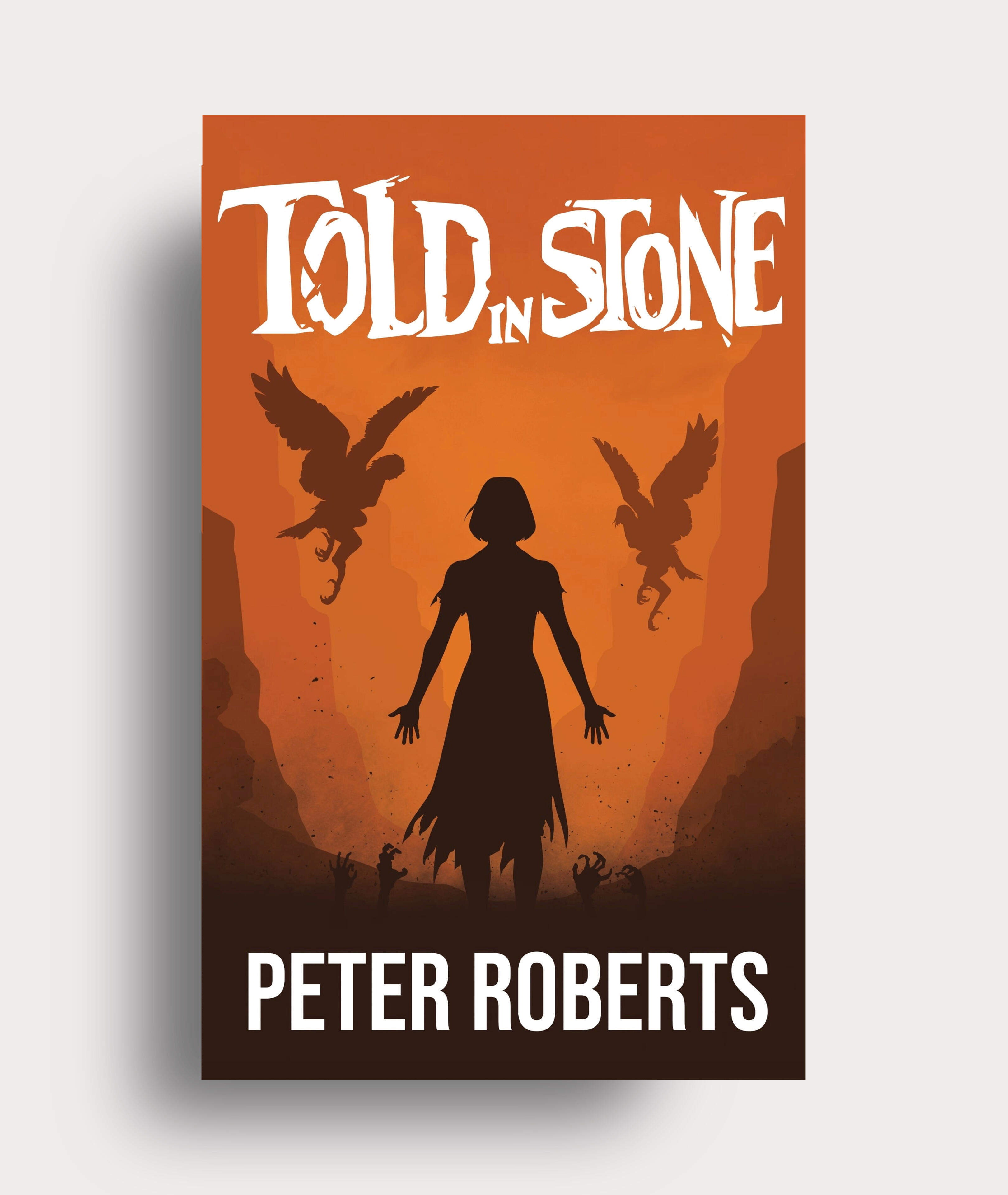
Told In Stone
Book 2 In the Leybound series will throw you into a world embroiled in war, where the battlefield is a crucible for men and magic.Leybound are going missing. A traitor lurks in the Arcanum. And the Warcasters have returned.But as the regiments march toward Fallow for the biggest battle of the war, newly commissioned Lieutenant Nathaniel Riot has his own problems. He's out of favor, out of money, and assigned to guard the walking wounded while others seek glory.When he saves the life of a Faelen Lord, Riot gains a patron, and a chance to move up the ranks. To claim it, he'll have to pass through the treacherous red land of the Echo, where fanatical Faelen monks, ruthless mercenaries, and old enemies lie in wait.If he succeeds, the Captain’s pendant will be his. If he fails, he’ll be just another corpse left in a fading land.The history of the Faelen is Told in Stone.
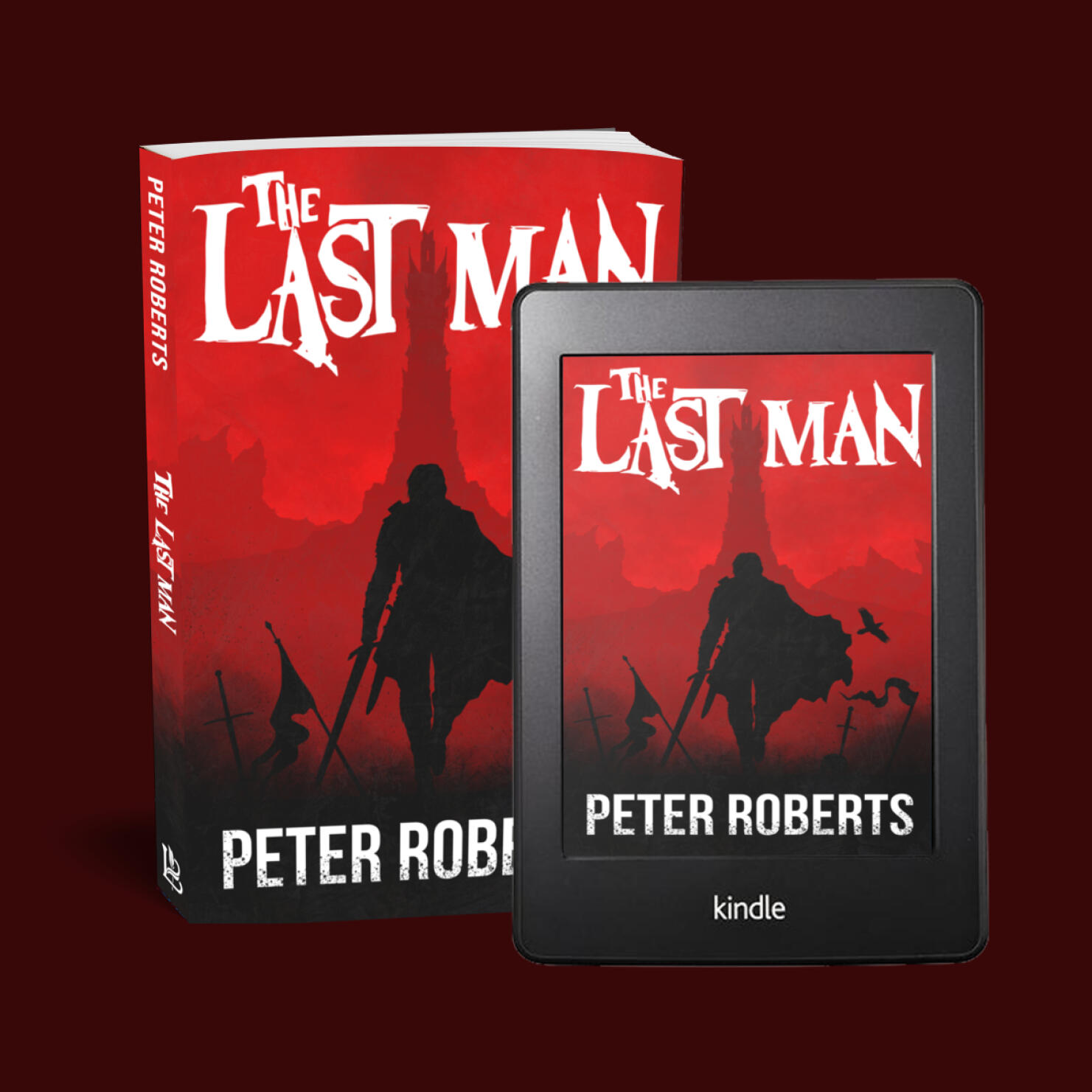
The Last Man
While I've been writing for 3 years, this is the first story I feel confident in publishing. Discover the 4.6-star on Amazon (rating from Royal Road).Once, they called him the last man. Now, after twenty years of war, Nathaniel Riot is little more than a relic—discarded, betrayed, and sentenced to die.Offered a grim choice between the noose and the path of the damned, Riot chooses the only option left: become Leybound.Infused with raw, untamed leypower, Riot must carve his own path in a world that refuses to make room for him. He’ll grind his way to mastery, uncovering the hidden depths of his magic, forging uneasy alliances, and taking on those who would see him broken. Because power is the only law that matters, and if he wants to rise, he’ll have to take it.The war isn’t over. And neither is he.
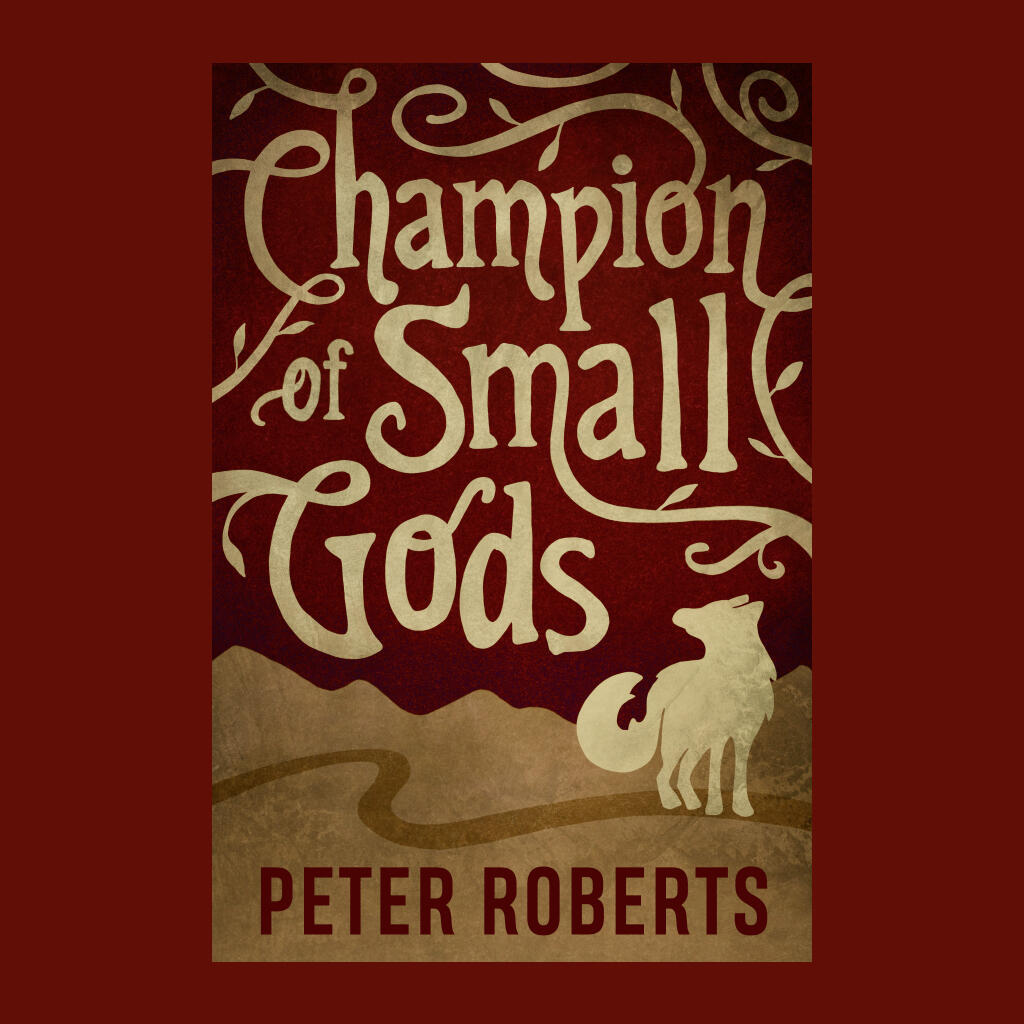
CHAMPION OF SMALL GODS
Join over 2,000 readers and discover the first story from Peter Robert that’s earned a 4.5-star rating from 300+ ratings on Royal RoadKonrad's brother was the hero of the valleys when he was chosen as the champion of the Father. Now Konrad has been chosen too, only his gods are slightly smaller, the smallest in fact.He’s already got three gifts, two quests and he owes a favour to an old hermit.As soon as he buys his freedom he can set off adventuring - if he can find a sword.

About me
Peter Roberts
With great reviews and a growing following on Royal Road, I'm thrilled to share Leybound, the first novel in the fast-paced grimdark fantasy series, The Last Man, and Champion of Small Gods on Royal Road.My stories deliver rich worlds, flawed heroes, and gripping, emotionally charged adventures that stay with you long after the final page. If you’re a fan of fantasy where choices carry weight and worlds breathe with life, check out my stories.Take a front-row seat to my storytelling journey, follow me on Royal Road, Instagram, Facebook, join my Discord or join my mailing list here.
UPDATES
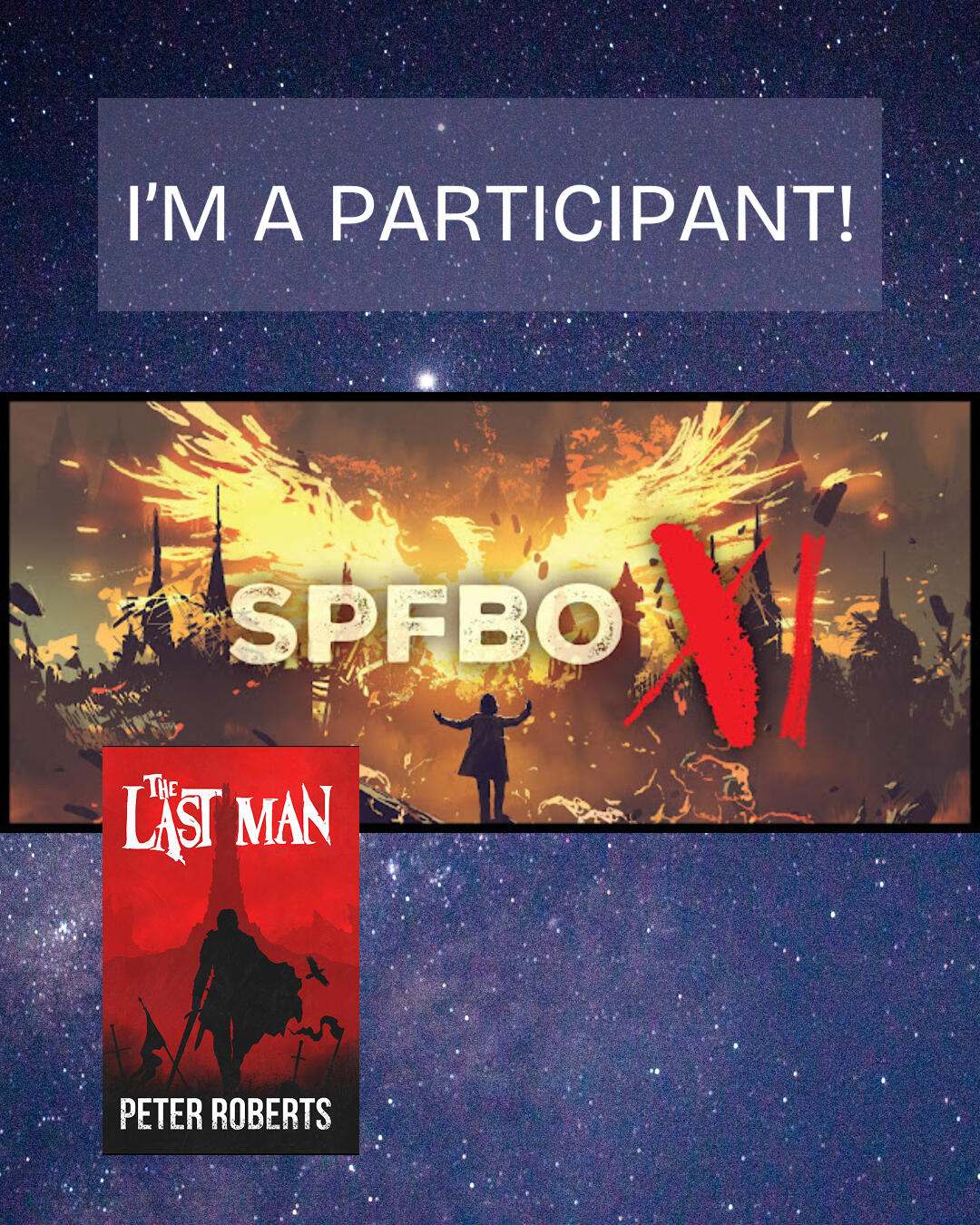
4 January 2026
300 Books, 10 Judges, 1 Champion
I’m incredibly grateful (and still a bit stunned) to share that I’ve been included in the Eleventh Self-Published Fantasy Blog-Off (SPFBO 11). I’ve followed this competition for years, watched indie fantasy careers take off through it, and never quite imagined I’d one day be a contender.For those who aren’t familiar, SPFBO is an annual competition created by Mark Lawrence, where hundreds of self-published fantasy novels are reviewed by book bloggers and content creators, progressing through several rounds to a single winner. It’s become one of the most respected showcases for indie fantasy.I’ve already been assigned to Noah Brisk to judge my book against 30 others. Noah creates great fantasy content on Instagram and YouTube, and he also has his own book coming out soon, The Tethered God, which I’m excited to check out and support.No matter how the competition unfolds, I’m genuinely thankful for the opportunity and thrilled to see The Last Man standing alongside so many fantastic indie stories.

31 December 2025
2025 in Review
Midnight isn't far away, and I’m following a new tradition and taking a moment to look back on 2025 — a year that somehow managed to be both exhausting and deeply satisfying.First, thank you to everyone who’s followed along, supported the books, left a comment, sent a message, or quietly picked something up and disappeared into the world. Knowing the stories are being read makes the long hours worth it.
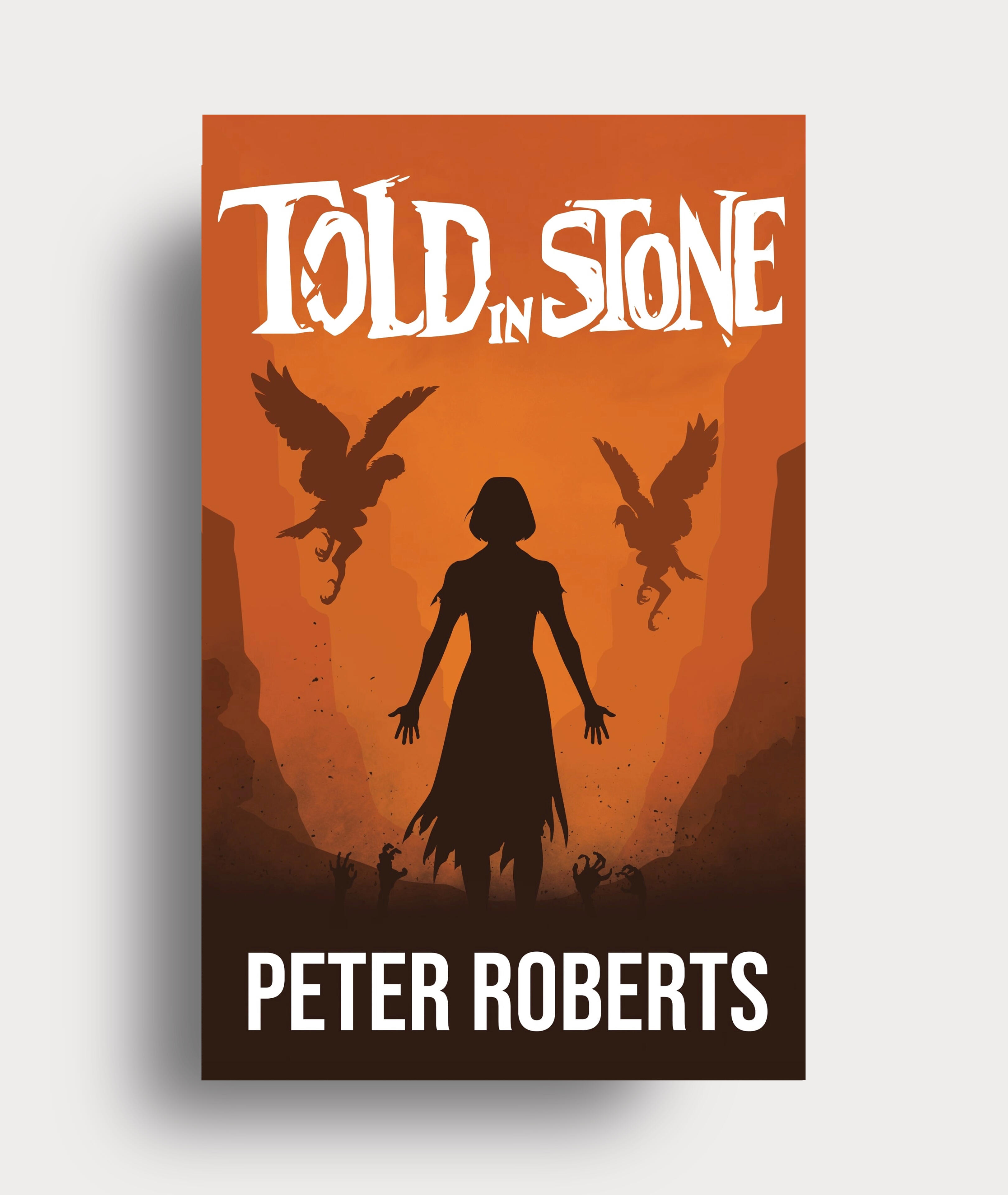
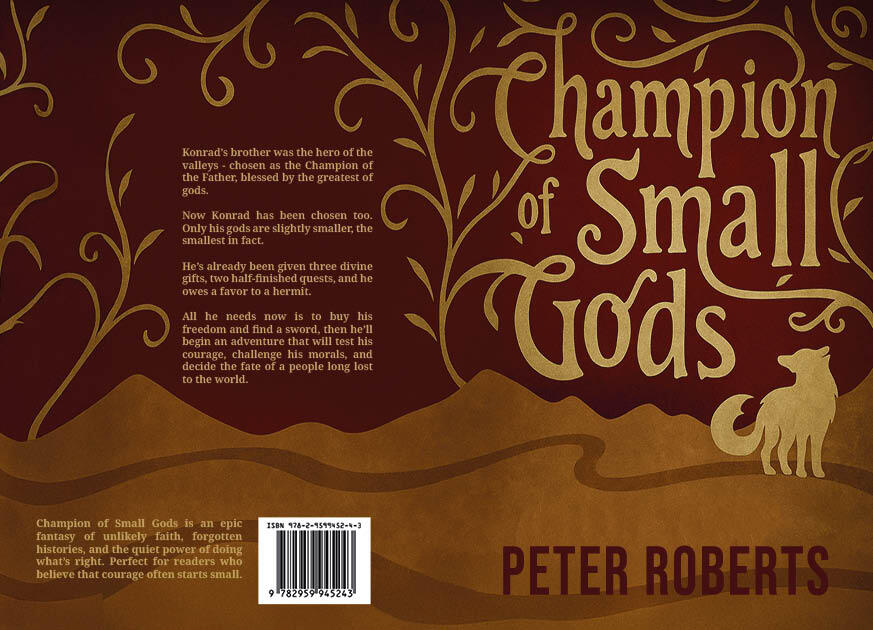
20 December 2025
Two new books to round out 2025!
In a bit of a final push, I managed to get two books published before the end of 2025, bringing the total to three published books so far. Seeing them all listed together under my author profile online still feels a little surreal. What started as late nights, drafts, and stubborn persistence has turned into something real that people can actually read. It’s been incredibly motivating to watch the series take shape and know the story is finally out in the world. It won’t be long now until I’m holding the hardcopies in my hands, which feels like a milestone I’ve been working toward for a long time. I’m deeply grateful to everyone who’s followed, supported, and encouraged the journey so far.
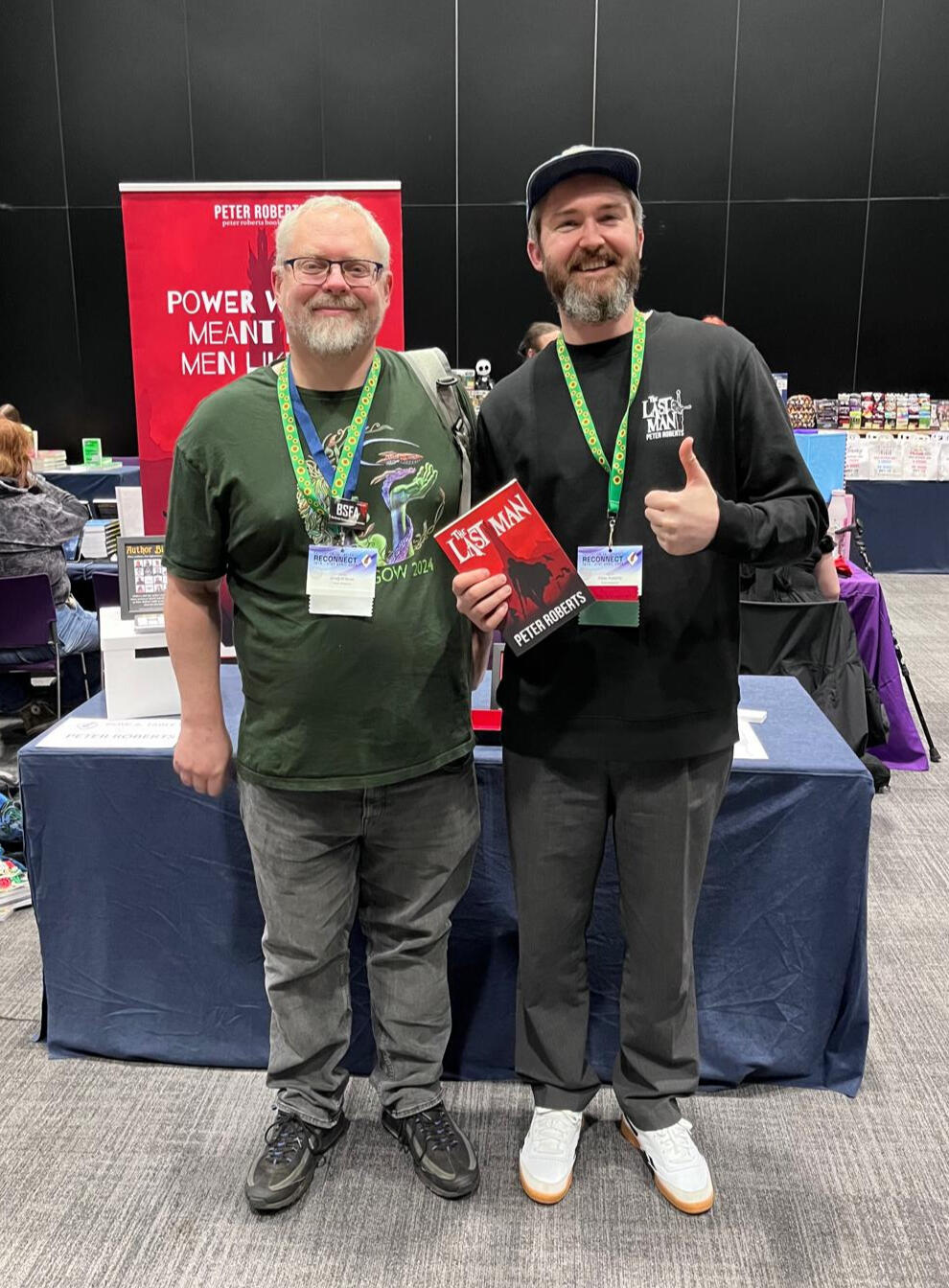
3 July 2025
A Wonderful Review
One of the best parts of writing The Last Man has been getting to meet readers face-to-face — and EasterCon earlier this year was no exception.In Belfast, had the pleasure of meeting Ant, who picked up the very first copy I sold that weekend. We had a great chat about fantasy, writing, and of course, The Last Man.A few months later, Ant kindly reached out to share his review of the book on SFBook, which you can read here. It means a lot to see the story resonating with readers, especially in such a thoughtful and generous way.Here’s a photo from that day — a small reminder of why these events are so special: meeting people who love the same kinds of stories I do.Thank you again, Ant, and thanks to everyone who stopped by the table to chat, grab a book, or just say hello.
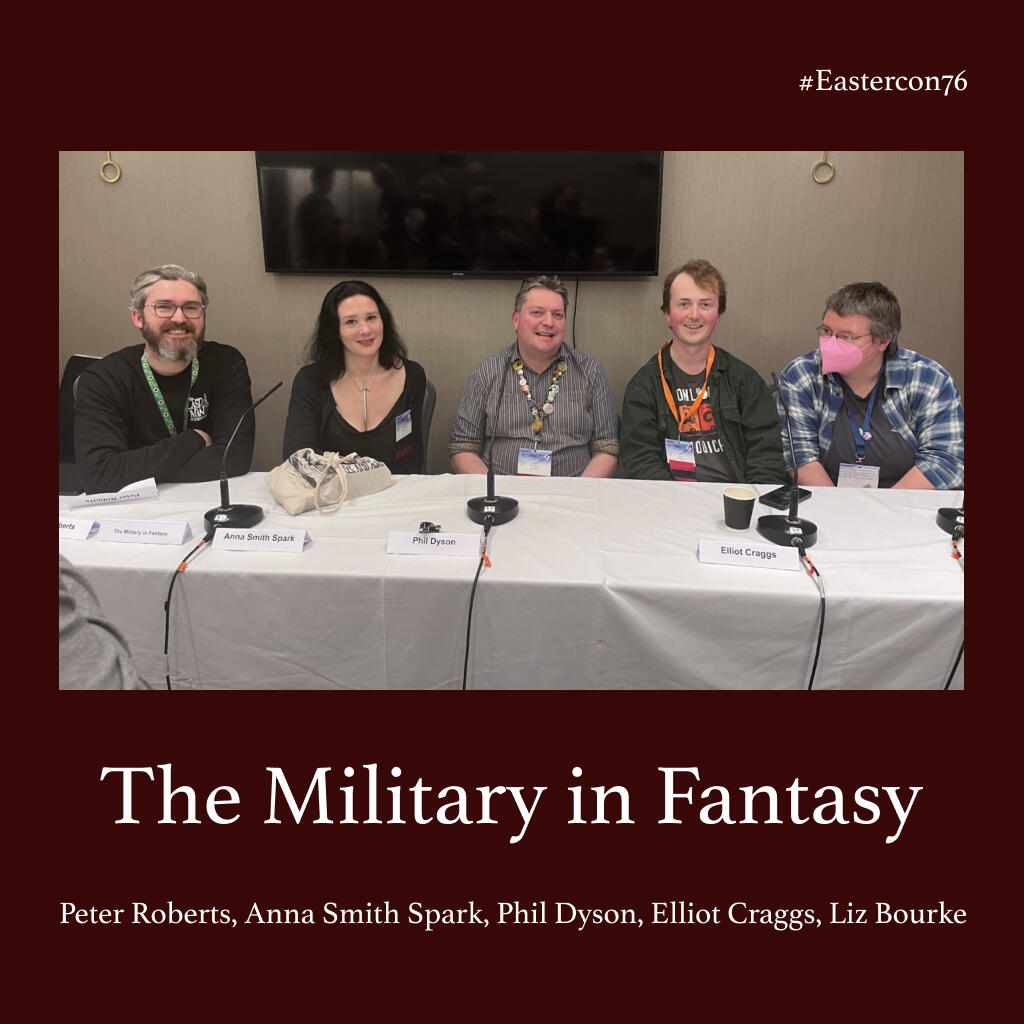
1 May 2025
War Councils, Battle Lines, and Cleanup Crews: Writing Large-Scale War in Fiction
At EasterCon76, I hosted a discussion with military history buffs, writers, and reviewers unpacking one of the biggest challenges in fantasy and science fiction writing: how to make large-scale warfare feel real on the page. The panel, featuring Elliot Craggs, Phil Dyson, Anna Smith Spark, and Liz Bourke, explored what it takes to build compelling armies, coordinate tactics, and bring the chaos and consequences of war to life.
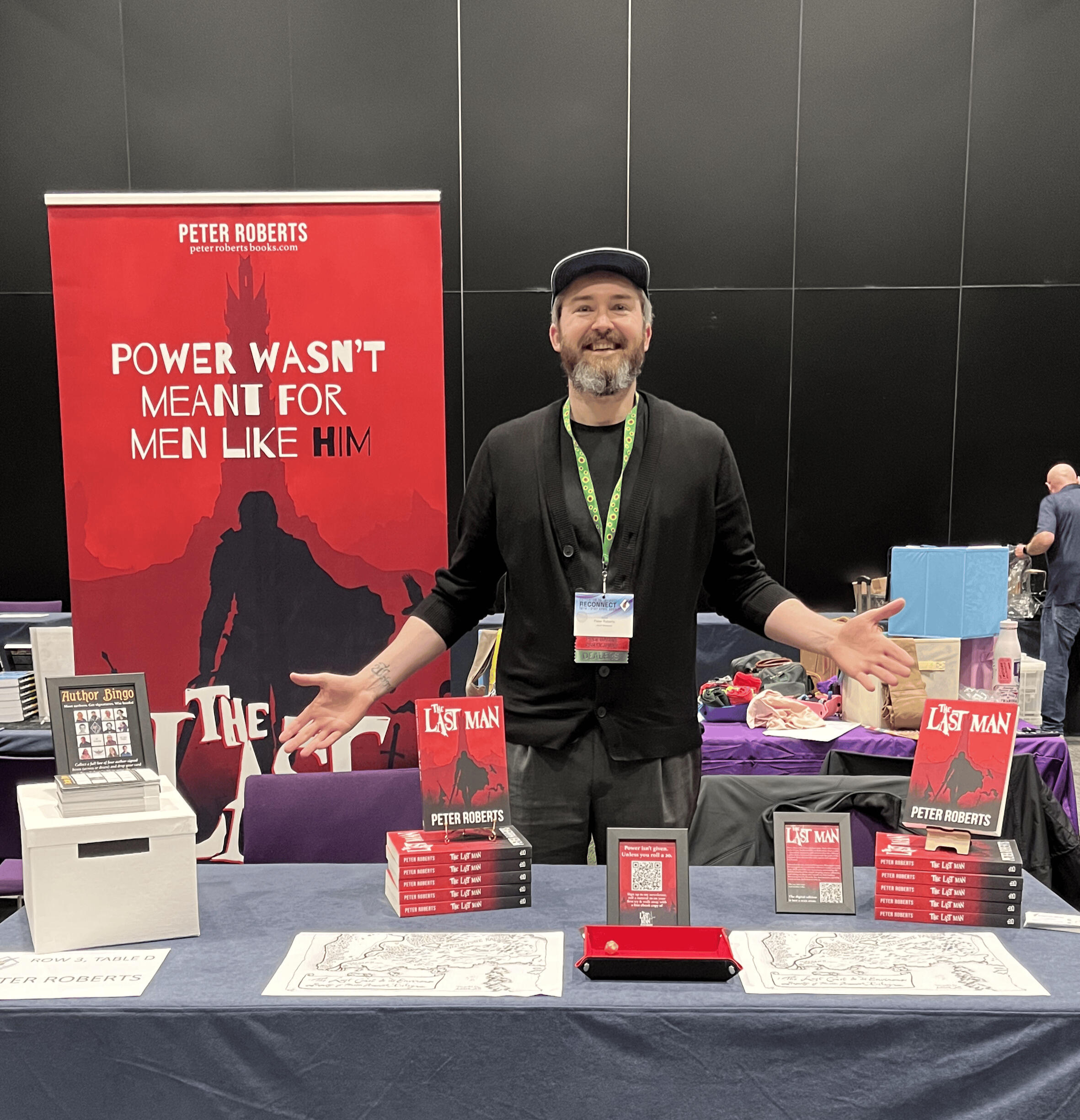
19 April 2025
The most impactful way to help an author
If you’ve read a book and enjoyed it, one of the most impactful things you can do is leave a short, honest review. Reviews don’t just reflect what readers think, they also shape how widely a book is seen. Reviews help boost visibility, build credibility, and get that book in front of new readers. Even just a sentence can make a difference.Reviews build trust with new readers
If you think about the last time you bought a book online, chances are that you glanced at the star rating or read a few reviews to get a sense of whether it was right for you. That’s what other readers are doing too. Reviews, especially from real readers, create a layer of trust.
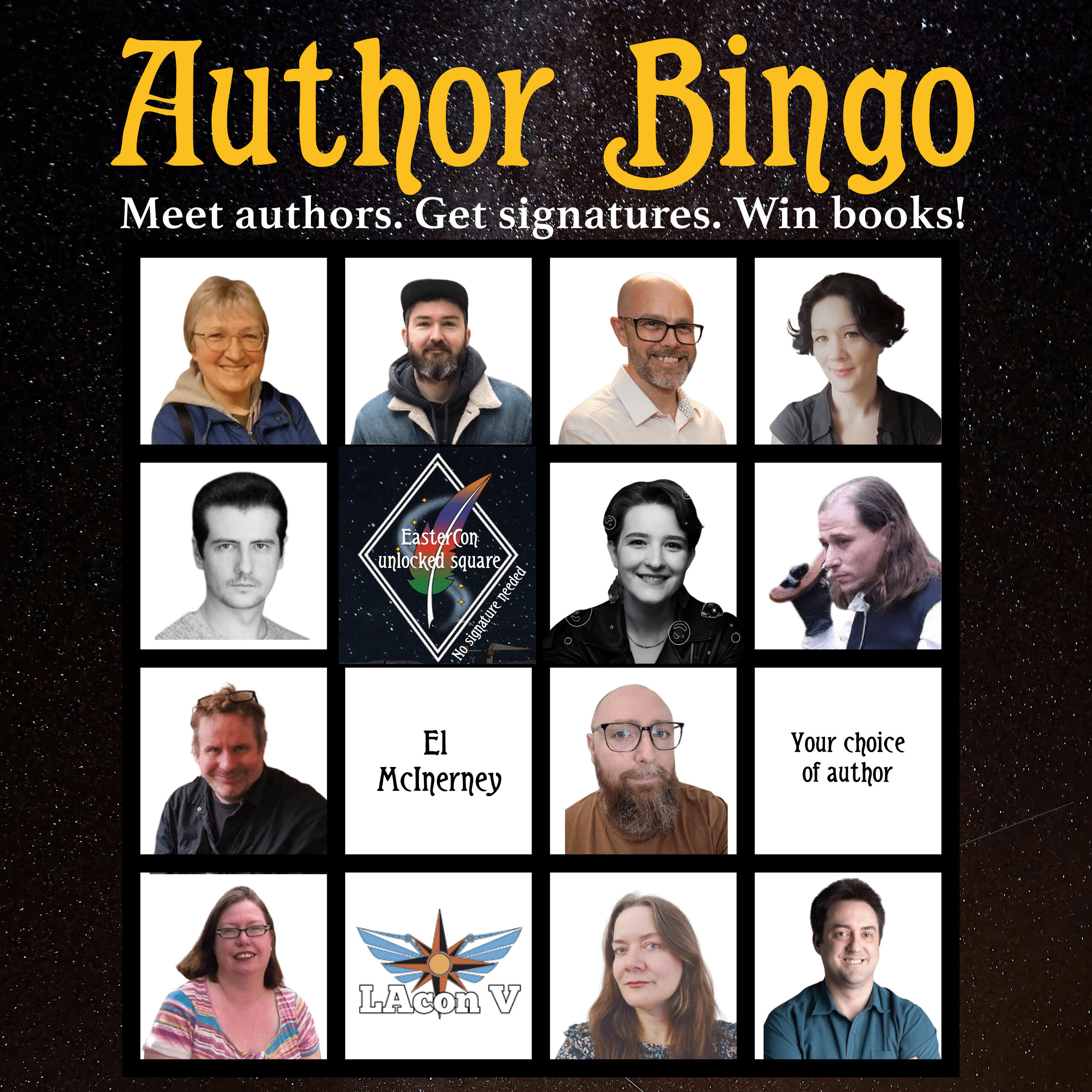
20 March 2025
Updated 22 April 2025
Something new at Eastercon 2025: Author Bingo
EDIT: Congratulations to this year’s Author Bingo winners, and thanks to everyone who joined in the fun!This year at Eastercon Belfast, something new is happening in the dealer room. It’s called Author Bingo, and yes, it’s exactly what it sounds like: bingo, but with authors.
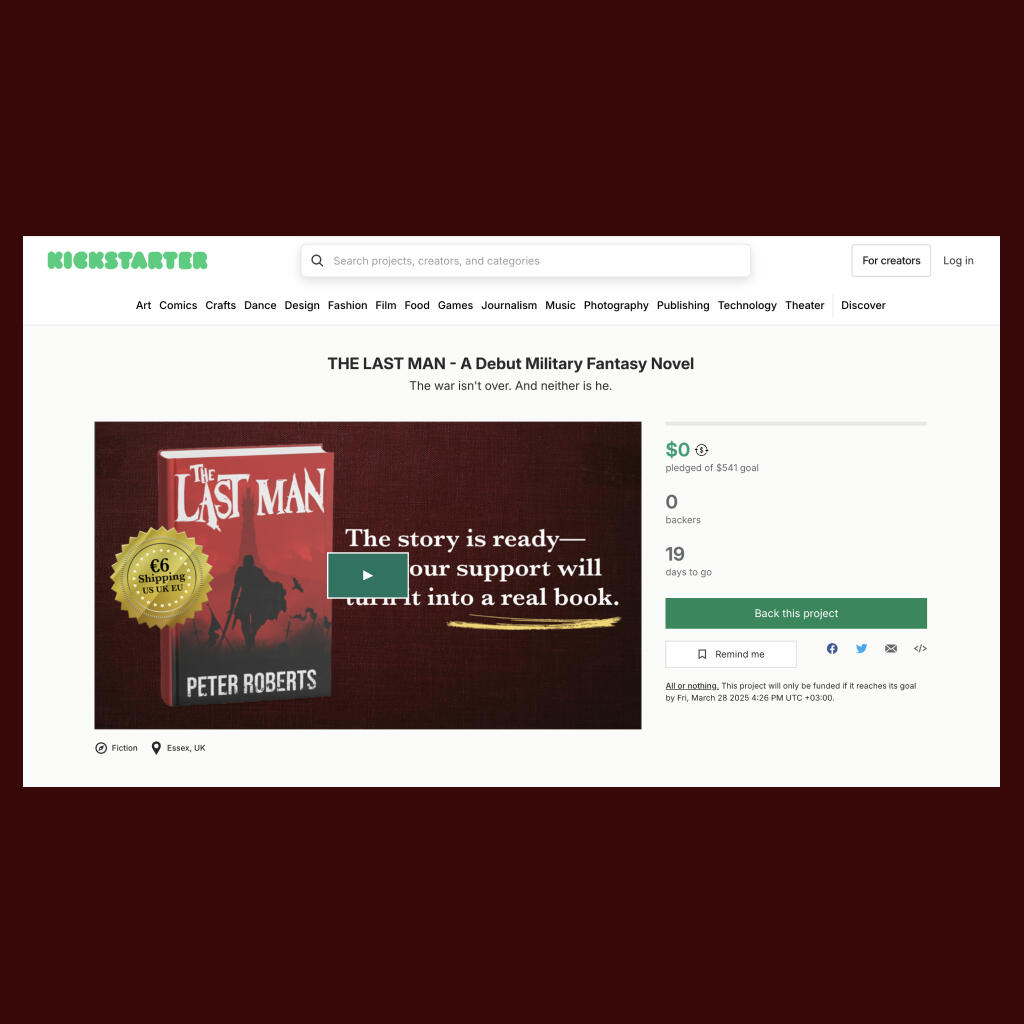
8 March 2025
Kickstarting my career
After years of dreaming, writing, and refining, my debut grimdark fantasy novel, The Last Man, is finally live on Kickstarter. It’s surreal to say that out loud—this story has lived in my head for so long, and now it’s out in the world, ready for readers who love gritty, progression-based fantasy as much as I do.If you’re into relentless protagonists who claw their way forward through sheer willpower, a magic system built on training and discovery, and a world where political and cultural tensions shape every battle, then The Last Man is for you. This book is my attempt to capture everything I love about the genre—the struggle, the depth, the slow, earned climb toward power.
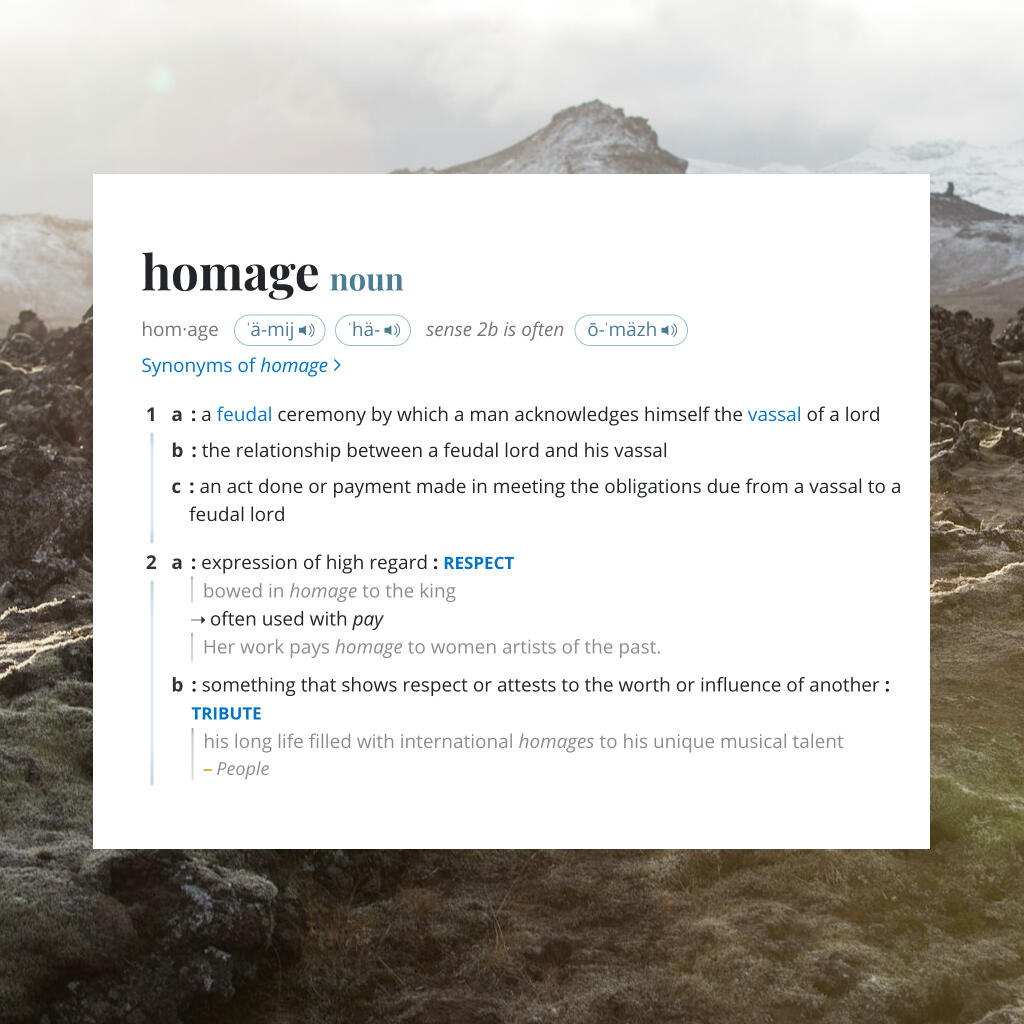
20 February 2025
Homage
The Leybound series follows a long fantasy series tradition and is in part an homage to all of the worlds, stories and characters that I love the most and the books I've read and re-read dozens of times.(I also wanted to make my literary heroes shoot magic from their palms, but isn't that what everyone wants?)...

31 December 2024
2024 in Review
Hi everyone,It’s about six hours from the stroke of midnight where I live and I’m rounding out the year that's gone by—and what an incredible journey it’s been.First of all, I want to thank everyone on Patreon for all of your incredible support throughout the year (and for multiple years for some people). Without you all, I wouldn't have been able to pay the book cover designer for the new cover of Leybound that will be released in April next year. Your support made it possible, and I cannot wait to share...
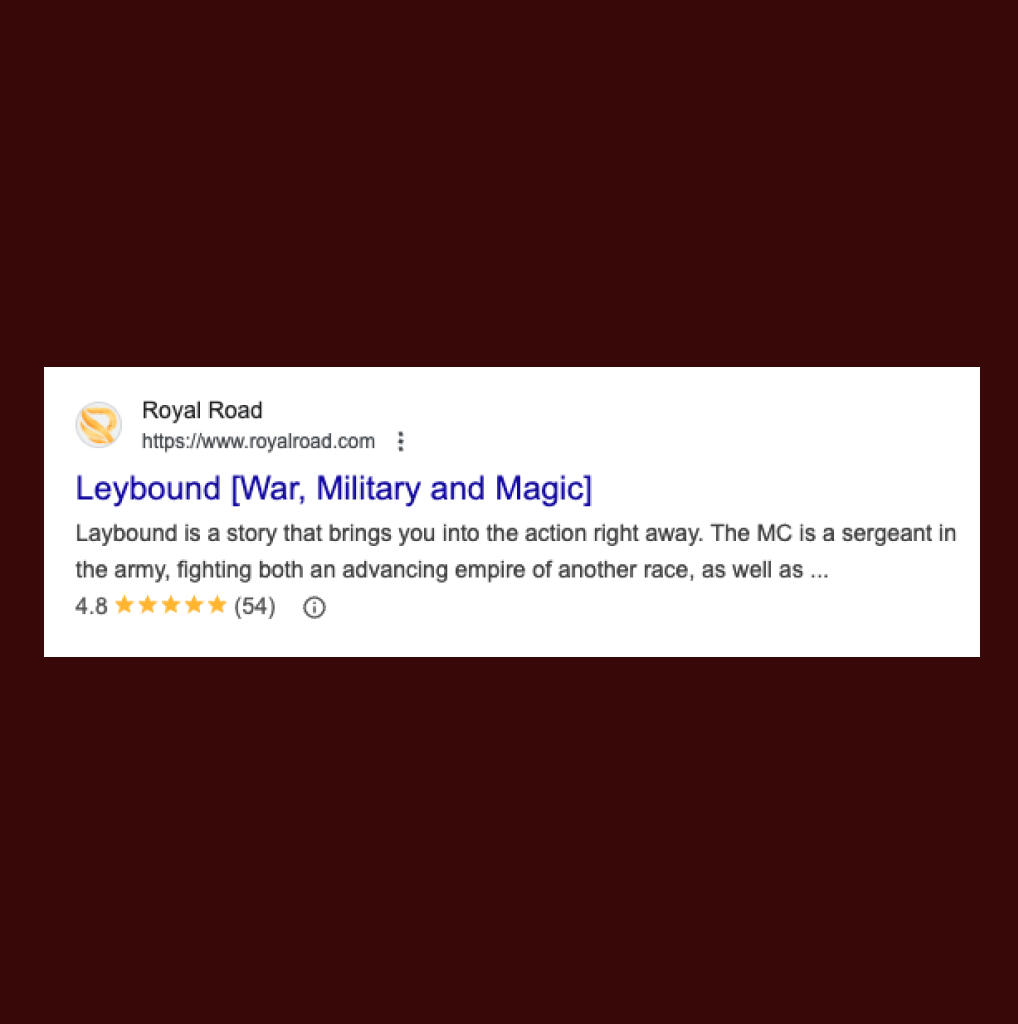
22 December 2024
Leybound to be published
I’m thrilled to share that Leybound, the web-serial story you’ve been following and supporting for the past year, is taking its next big step—it’s being transformed into a fully-fledged book!With new edits, expanded scenes, and plenty of polish, the novel will bring even more depth to the world and characters you’ve come to love.Thank you for those who have joined me on this journey—none of this would have been possible without your enthusiasm, feedback and encouragement! For those new to the book, check it out here on Royal Road or here on Patreon where you can also support my work.Join my Discord or follow me on Instagram for more updates as we get closer to the launch day in April 2025.

18 December 2024
I got a table at EasterCon
I’m thrilled to share that I’ll be attending EasterCon this April 2025 in Belfast!I’ll have a table where you can stop by, chat about writing, and grab a copy of my work if you're interested. It’s a great opportunity for me to connect with fellow writers, readers, and fans of speculative fiction. As someone just starting out, I’m excited to join the conversation, learn from others, and dive into all things storytelling. Whether you’re into epic fantasy, sci-fi, or anything in between, I look forward to sharing ideas and meeting new faces.If you’re at EasterCon, be sure to swing by my table—I’m always up for a good chat about the craft and where the genre is headed.
Get in touch
Whether you’re a fellow writer, a reader, or just someone interested in chatting about fantasy, feel free to reach out. If you have questions about my work, upcoming events, or just want to discuss storytelling in general, don’t hesitate to send a message. Looking forward to hearing from you!Use the form or email me directly, [email protected]Looking to sign up to the mailing list?
Subscribe here
31 December 2025
2025 in Review
Hi everyone,Midnight isn't far away, and I’m following a new tradition and taking a moment to look back on 2025 — a year that somehow managed to be both exhausting and deeply satisfying.First, thank you to everyone who’s followed along, supported the books, left a comment, sent a message, or quietly picked something up and disappeared into the world. Knowing the stories are being read makes the long hours worth it.2025: writing, publishing, and pushing through.This year was about finishing things.I published The Last Man, the first book in the Leybound series, clocking in at around 90,000 words and officially kicking off the story I’ve been carrying around in my head for far too long. Not long after, I followed it with Told in Stone, book two in the series, also landing at roughly 90,000 words. Getting two full novels over the line in a single year felt ambitious at the start — and borderline unhinged by the end — but seeing them out in the world together made it worth it.On top of that, I went back to where it all started and re-edited and republished Champion of Small Gods, all 190,000 words of it. My fingers are tired. My hands are sore. I’m fairly sure they’re still recovering.Somewhere in the middle of all this, I also recorded my own audiobook for The Last Man. It was a rewarding experience, and I’m glad I did it — but it also confirmed something important: I’m much better off staying behind the keyboard. Respect to narrators everywhere.Seeing these books sitting together under my author profile online still feels a little surreal, and it won’t be long now until I’m holding the hardcopies in my hands. That part never gets old.Reading and gaming highlights.
Despite all the writing, I still managed to read a lot this year. Standouts included The Dead Zone by Stephen King, Tigana by Guy Gavriel Kay, and John Gwynne’s Bloodsworn trilogy, which absolutely lived up to the hype.On the gaming side, I spent plenty of time in Project Zomboid, lost myself again in Ghost of Yōtei, and — inevitably — logged many hours in World of Tanks, which becomes mandatory when you have a 13-year-old nephew.Looking ahead to 2026.
I’m heading into the new year with momentum. The first draft of book three in the Leybound series is already complete, which feels like a small miracle in itself. The big question now is whether I can pull off publishing book three and book four in the same year. Ambitious? Absolutely. Impossible? Maybe not. Watch this space.Alongside the writing, I’ll also continue running Kickstarters for limited-edition hardbacks of the books. The goal is simple: to make sure everyone who already has a copy gets the chance to complete the set as the series grows.It’s been a year of persistence, problem-solving, and more drafts than I care to admit — but also a year of real progress. Thank you for being part of it.Here’s to resting sore hands, starting the next chapter, and whatever 2026 decides to throw at us.Happy New Year,
Peter

20 December 2025
For Reviewers: About Champion of Small Gods
Author: Peter Roberts
Publication Date: December 2025
Genre: Epic Fantasy / Sword and Sorcery / Action and Adventure
Formats Available: ARC copies in EPUB, MOBI, and PDF (Print available on request)
Blurb
Konrad’s brother was the hero of the valleys — chosen as the Champion of the Father, blessed by the greatest of gods.Now Konrad has been chosen too. Only his gods are slightly smaller, the smallest in fact.He’s already been given three divine gifts, two half-finished quests, and he owes a favor to a hermit.All he needs now is to buy his freedom and find a sword, then he'll begin an adventure that will test his courage, challenge his morals, and decide the fate of a people long lost to the world.
Champion of Small Gods is an epic fantasy of unlikely faith, forgotten histories, and the quiet power of doing what’s right. Perfect for readers who believe that courage often starts small.
What to ExpectChampion of Small Gods delivers a grounded, character-first epic fantasy that blends classic adventure with modern progression sensibilities. Readers can expect a story that rewards patience, curiosity, and emotional investment.A distinctive progression-based magic system rooted in training, experimentation, and lived experience rather than instant power-ups. Growth is earned through effort, failure, and discovery, making each advancement feel meaningful.A richly built high-fantasy world shaped by forgotten gods, suppressed histories, and competing belief systems. Politics, faith, and power are tightly interwoven, and the consequences of past choices echo through the present.A slow-burn rise from the bottom, following a protagonist who begins with little status, limited resources, and no grand destiny. Power comes gradually, and every step forward is hard-won.A character-driven narrative focused on moral tension, survival, and difficult choices. Victories are rarely clean, alliances are uneasy, and doing the right thing often carries a cost.Deep backstories and layered mysteries, revealed organically through travel, conflict, and conversation rather than exposition. The world opens up piece by piece, rewarding attentive readers.A grounded, gritty tone where violence has weight, trust is fragile, and small decisions can have lasting consequences. This is not power fantasy for its own sake — it’s about responsibility, restraint, and growth.A strong emotional core, balancing action and intrigue with quieter moments of reflection, loyalty, and doubt. Relationships matter, and characters remember what they’ve lost.
Champion of Small Gods is an epic fantasy of unlikely faith, forgotten histories, and the quiet power of doing what’s right. Perfect for readers who believe that courage often starts small.
About the author
Peter Roberts is a proudly self-published author living in Paris, France. He got his start in 2021 publishing his stories on Royal Road where he gained a loyal following. His books are now available on Amazon and The Last Man is the first of five books in the Leybound series
20 December 2025
For Reviewers: About Told In Stone
Author: Peter Roberts
Publication Date: December 2025
Genre: Gritty Military Fantasy / Sword and Sorcery / Epic Fantasy
Formats Available: ARC copies in EPUB, MOBI, and PDF (Print available on request)
Blurb
Leybound are going missing. A traitor lurks in the Arcanum. And the Warcasters have returned.But as the regiments march toward Fallow for the biggest battle of the war, newly commissioned Lieutenant Nathaniel Riot has his own problems. He's out of favor, out of money, and assigned to guard the walking wounded while others seek glory.When he saves the life of a Faelen Lord, Riot gains a patron, and a chance to move up the ranks. To claim it, he'll have to pass through the treacherous red land of the Echo, where fanatical Faelen monks, ruthless mercenaries, and old enemies lie in wait.**If he succeeds, the Captain’s pendant will be his. If he fails, he’ll be just another corpse left in a fading land.
What to Expect
This book is perfect for fans of John Gwynne, Pierce Brown, and Joe Abercrombie—those who enjoy hard choices, brutal magic, and characters who refuse to stay down, and you can expect:
> A unique magic system built on training, exploration, and skill discovery.
> A military fantasy setting marked by political intrigue, cultural conflict, and brutal power struggles.
> A gritty, character-driven story about survival, betrayal, and the fight to rise above your station in an unfair world.
> A slow-burn mastery arc—watch Riot grind his way from the bottom, learning new skills and growing into his power.
> Deep backstories, mysteries, and uneasy alliances across a continent rocked by war.
About the author
Peter Roberts is a proudly self-published author living in Paris, France. He got his start in 2021 publishing his stories on Royal Road where he gained a loyal following. His books are now available on Amazon and The Last Man is the first of five books in the Leybound series
19 April 2025
For Reviewers: About The Last Man
Author: Peter Roberts
Publication Date: July 2025
Genre: Gritty Military Fantasy / Sword and Sorcery / Epic Fantasy
Formats Available: ARC copies in EPUB, MOBI, and PDF (Print available on request)
Blurb
Once, they called him the last man. Now, after twenty years of war, Nathaniel Riot is little more than a relic—discarded, betrayed, and sentenced to die.Offered a grim choice between the noose and the path of the damned, Riot chooses the only option left: become Leybound.Infused with raw, untamed leypower, Riot must carve his own path in a world that refuses to make room for him. He’ll grind his way to mastery, uncovering the hidden depths of his magic, forging uneasy alliances, and taking on those who would see him broken. Because power is the only law that matters—and if he wants to rise, he’ll have to take it.The war isn’t over. And neither is he.
What to Expect
This book is perfect for fans of John Gwynne, Pierce Brown, and Joe Abercrombie—those who enjoy hard choices, brutal magic, and characters who refuse to stay down, and you can expect:
> A unique magic system built on training, exploration, and skill discovery.
> A military fantasy setting marked by political intrigue, cultural conflict, and brutal power struggles.
> A gritty, character-driven story about survival, betrayal, and the fight to rise above your station in an unfair world.
> A slow-burn mastery arc—watch Riot grind his way from the bottom, learning new skills and growing into his power.
> Deep backstories, mysteries, and uneasy alliances across a continent rocked by war.
About the author
Peter Roberts is a proudly self-published author living in Paris, France. He got his start in 2021 publishing his stories on Royal Road where he gained a loyal following. His books are now available on Amazon and The Last Man is the first of five books in the Leybound series
19 April 2025
Why leaving a review is one of the best ways to support an author
If you’ve read a book and enjoyed it, one of the most impactful things you can do is leave a short, honest review. Reviews don’t just reflect what readers think, they also shape how widely a book is seen. Reviews help boost visibility, build credibility, and get that book in front of new readers. Even just a sentence can make a difference.Reviews build trust with new readers
If you think about the last time you bought a book online, chances are that you glanced at the star rating or read a few reviews to get a sense of whether it was right for you. That’s what other readers are doing too. Reviews, especially from real readers, create a layer of trust. They don’t have to be long or poetic. A simple comment like “Great characters and a satisfying ending” or “Loved the pacing” helps potential readers feel more confident in giving the book a try.Reviews increase visibility
Bookstores like Amazon use reviews to determine what gets recommended. More reviews equals more chances for a book to appear in “Also Bought” sections, emails, or search results. Without reviews, a book, no matter how good, is unlikely to be discovered by new readers.Reviews encourage authors to keep going
For the person behind the story, a review is more than just a number. It’s a sign that their work reached someone, connected, mattered. Writing a book is a long, often solitary process. Reviews remind authors that the late nights, revisions, and risks were worth it. They also give authors a clearer sense of what readers are responding to, which can be both inspiring and motivating for future books.If you’re looking for a place to start, consider leaving a review for The Last Man by Peter Roberts. You can share your thoughts on Amazon or Goodreads even if it’s just a line or two. It’s a small act, but it helps bring the story to new readers and supports the author more than you might imagine.
31 December 2024
2024 in Review
Hi everyone,It’s about six hours from the stroke of midnight where I live and I’m rounding out the year that's gone by—and what an incredible journey it’s been.First of all, I want to thank everyone on Patreon for all of your incredible support throughout the year (and for multiple years for some people). Without you all, I wouldn't have been able to pay the book cover designer for the new cover of Leybound that will be released in April next year. Your support made it possible, and I cannot wait to share the new cover with you.2024 in writing, and editing, then editing again.
In January, I started writing my second book, the first in a series of five (or maybe six—I haven’t decided yet). I learned a lot from my first attempt, Champion of Small Gods. The biggest lesson? The only parts of the plan that truly matter are the beginning, the end, and perhaps a few things in the middle. Characters, I’ve discovered, don’t always know who they are until you dig into the nitty-gritty details of the final stages of editing.Much of the time my characters didn’t seem to remember their own names. They certainly changed how they spelled them often—though I think that’s rather more my fault than theirs.In July, the book was finished, and I called it Leybound. It was released on Royal Road and Patreon—a healthy baby, weighing in at 75,000 words with a logical plot, colorful characters, and a magic system I obsessed over. Then in October, I handed the story to a developmental editor just to see what might happen, and quickly realized that the book wasn’t really finished. If I could take a guess, I would say it was about 85% done.I give my eternal thanks to Chris Bellehewe for showing me how to push it to the 100% mark. After the final, final edit, the book is about 95,000 words—and infinitely better for it. Oh, and the title got changed along the way. Thus in April, I’ll be releasing The Last Man in paperback.I also began writing the second book in the series in July. The book is called Told in Stone and currently exists as a solid fourth draft and tops out at 65,000 words. The plot is locked in, and everyone gets to where they need to be—though not all of them entirely know why they are going there (if that makes sense). Next year, I’ll send it off to my editor, Chris, and start the work of making it print-ready.TV and Movies
It’s been a year of nostalgia as I set out on a journey to watch the whole Star Trek canon in chronological order. Enterprise, Voyager, and Lower Decks were the standout heroes for me. When that was all wrapped up, I started watching Castle, mostly because I love the show The Rookie and Nathan Fillion is a fantastic and engaging actor. It’s a classic good-guys-and-bad-guys procedural TV series, along the lines of some of my other favorite shows like Elementary and White Collar.Other honorable mentions: Slow Horses, The Boys, and Silo.Gaming
This year, I’ve spent countless hours playing games with my 12-year-old nephew, and as a result, my PS stats have hundreds of hours of Minecraft, Fortnite, CoD, and World of Tanks.For myself, the standout game of 2024 was Ghost of Tsushima. I haven’t been so lost in a world since Skyrim or The Witcher 3. Where Skyrim had the rugged majesty of the mountains, and The Witcher was a grimdark immersion, Ghost is just. Damn. Beautiful. I haven’t spent so long just roaming around on my horse since Red Dead 2.The character work really stood out for me, and I found myself enjoying the interactions, instead of just spamming X to get through them.Upcoming in 2025
- January 15th - Book two Told in Stone will be released to Patreon members!
- April 2025, Eastercon Belfast - I'm going to be releasing the paperback version of The Last Man at the con and was fortunate enough to be offered a table in the dealer room!
- October 2025, World Fantasy Convention Brighton - I'll be there to release book two in the Riot's War Series, Told In Stone.There is so much to do before then, not limited to: designing maps for the books and the world, confirming the new covers with the artist, organizing printing of advanced review copies, and about a trillion other things that it takes to self-publish a book.It's going to be a great, stressful, and exciting year, and I'm looking forward to sharing it with you all here.Happy New Year!
Peter

20 February 2025
Hommage
The Leybound series follows a long fantasy series tradition and is in part an homage to all of the worlds, stories and characters that I love the most and the books I've read and re-read dozens of times.(I also wanted to make my literary heroes shoot magic from their palms, but isn't that what everyone wants?)The magnificent Cradle series by Will Wight showed me exactly what type of story I wanted to tell and how to tell it right. Cradle also introduced me to progression fantasy, and from there to the Royal Road website where I first posted my writing. This one thanks you Mr Wight.Nathaniel Riot was inspired by C.S Forester's, Horatio Hornblower, Bernard Cornwell's Richard Sharpe, and Terry Pratchett's Commander, Sir Samuel Vimes the Duke of Ankh (and blackboard monitor). I hope Riot has Hornblower's courage and deep sense of duty, Richard Sharpe's ruthlessness and loyalty to his men, and Vimes's cynicism. He certainly inherited the chip that all three have on their shoulders.The setting was easy to recreate because of my own love of French revolutionary history and the Napolionic wars, and the Hornblower and Sharpe series. I exchanged the French for the Faelen, the Spanish inquisition for the Wikkan, and finally smooth bore muskets and baker rifles for a system of magic that could be bound to common soldiers. Thus the Leybound were born.For those readers who love the same series that inspired me, I hope you will see any likeness as an homage.While the Leybound series is not technically progression fantasy like Cradle, it shares many elements.While it's not strictly grimdark, it borrows much from the morally grey setting of Joe Abercrombies First Law world.While it's not as whimsical or wonderous as the Discworld (how could anything be?), I still tried to make characters that delighted me.While Nathaniel Riot isn’t Hornblower, or Vimes, or Sharpe, the war isn’t over, and neither is he.
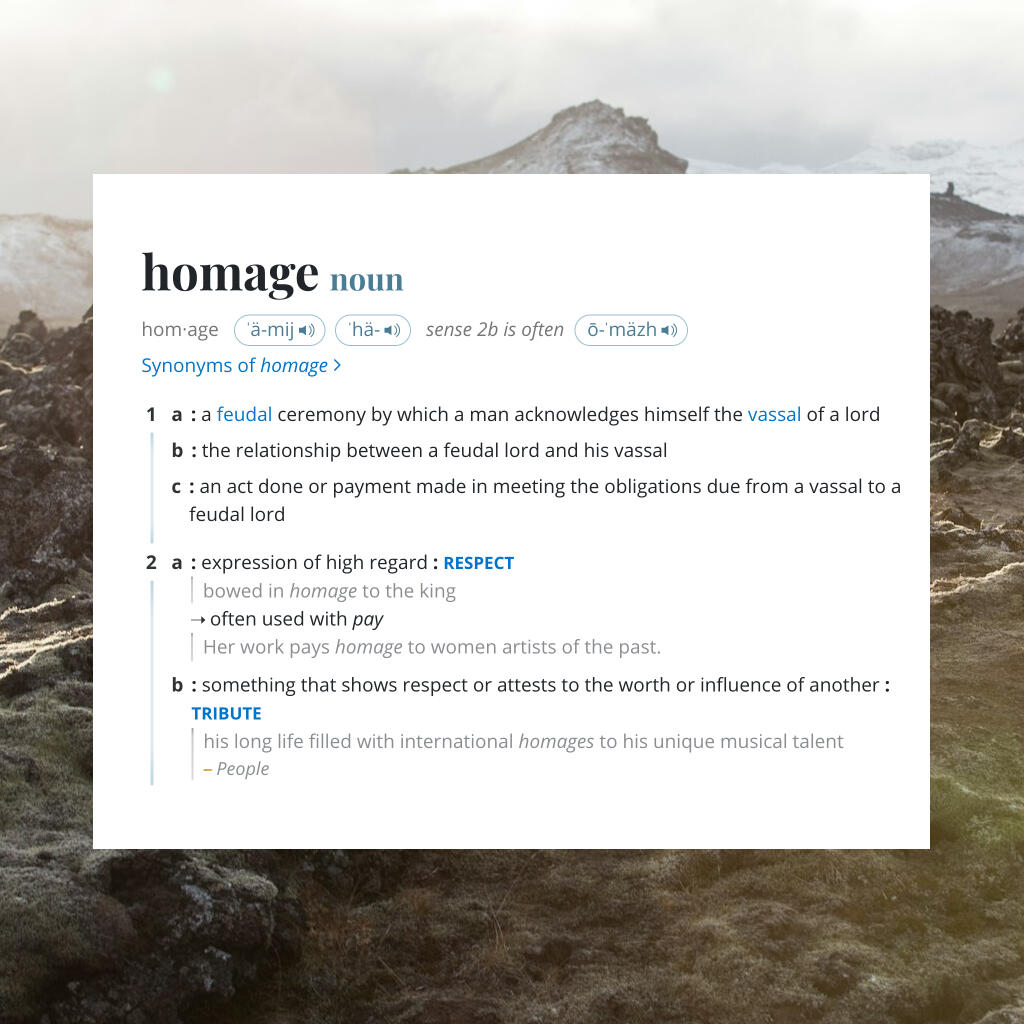
8 March 2025
Kickstarting my career
After years of dreaming, writing, and refining, my debut grimdark fantasy novel, The Last Man, is finally live on Kickstarter. It’s surreal to say that out loud—this story has lived in my head for so long, and now it’s out in the world, ready for readers who love gritty, progression-based fantasy as much as I do.If you’re into relentless protagonists who claw their way forward through sheer willpower, a magic system built on training and discovery, and a world where political and cultural tensions shape every battle, then The Last Man is for you. This book is my attempt to capture everything I love about the genre—the struggle, the depth, the slow, earned climb toward power.Kickstarter felt like the right way to launch it. This isn’t just about publishing a book; it’s about building something bigger. Through the campaign, I can offer backers special edition hardcovers, stunning artwork, and exclusive behind-the-scenes content—things that wouldn’t be possible through traditional publishing. It’s also a way to connect directly with readers who want to be part of the journey from the very beginning.If you want to help bring The Last Man to life, check out the campaign, grab a copy, and share it with anyone who might be interested. Every bit of support makes a difference, and I’m beyond grateful to everyone who’s been part of this so far.The story is already written, and your support can help turn it into a real book. Support the journey by visiting the Kickstarter campaign here
1 May 2025
War Councils, Battle Lines, and Cleanup Crews: Writing Large-Scale War in Fiction
At EasterCon76, I hosted a discussion with military history buffs, writers, and reviewers unpacking one of the biggest challenges in fantasy and science fiction writing: how to make large-scale warfare feel real on the page. The panel, featuring Elliot Craggs, Phil Dyson, Anna Smith Spark, and Liz Bourke, explored what it takes to build compelling armies, coordinate tactics, and bring the chaos and consequences of war to life.What makes military fiction ‘military’?
The discussion kicked off with the deceptively simple question: what actually defines military fiction? Phil Dyson argued that the military is not just about fighting; it’s about the legitimacy of state violence, the organization that makes such violence lawful. Liz Bourke highlighted that the concept of a “military” is relatively modern—in most of history, you had armies, not militaries, and these were often raised ad hoc rather than standing forces. This distinction, she argued, is crucial when creating believable military systems in speculative fiction.The panel agreed that military fiction differs from stories where battles are incidental or symbolic. Instead, military fiction cares about the machinery around the battles: logistics, supply lines, the people who drive the wagons and forge the arrows, not just the generals and heroes on the field.Why logistics matter more than magic
Dyson, whose academic background includes studying British defense policy, emphasized that many fantasy authors overlook the most important part of any military campaign: logistics. He raised the classic example of Legolas in The Lord of the Rings: “Who makes the arrows? Who delivers them?” Without considering how armies are fed, clothed, armed, and transported, battle scenes risk feeling hollow or implausible.This led to the panel’s shared belief that realism isn’t always about absolute historical accuracy but about internal consistency. As Elliot Craggs argued, readers care less about realism and more about consistency. If a world is built on logistics and realism, you can’t just abandon that when it becomes inconvenient.The role of mercenaries and the politics of violence
The conversation also touched on mercenary armies and their historical and modern roles. While professional soldiers may view mercenaries with suspicion - as hired killers without the legitimacy of state backing - the panel noted that many modern armies are, functionally, mercenary forces because soldiers fight for pay. This tension between legitimacy, loyalty, and economics can add a rich complexity for writers.
Liz Bourke highlighted how aristocracies historically legitimized their power by claiming superior skill in warfare, or simply by crafting a myth around that claim. Whether warlords or kings, military success (or the perception of it) often underpins political control.The heart of a battle scene: Whose story is it?
The panelists stressed that one of the key decisions when writing large-scale battles is choosing whose eyes the reader sees through. Anna Smith Spark shared her own approach, drawing from the Iliad, War and Peace, and Anglo-Saxon battle poetry to visualize battles at both the strategic (bird’s-eye) and personal (on-the-ground) level. Her own work shifts between these layers, between commanders directing armies and foot soldiers terrified and confused in the melee.For Spark, writing battles is not just a narrative exercise but “a way of pushing language to its limits,” likening it to writing about sex or divine experience, trying to express something almost inexpressible.Balancing plausibility and storytelling
One of the liveliest parts of the discussion centred on how much realism readers actually want. The panel acknowledged that while total logistical accuracy might collapse a book under its own weight, ignoring these realities completely can break immersion. Phil Dyson summed it up neatly with the saying: “Amateurs talk tactics. Professionals talk logistics.”The consensus: writers should know the realities well enough to decide when and how to cheat—and to cheat confidently.Recommended resources for writers
The panel shared a wealth of recommendations for writers looking to research military history without getting lost in technical manuals:
— Supplying War by Martin Van Creveld Highly recommended for understanding logistics.
— A Collection of Unmitigated Pedantry (blog) Great primers on military history and logistics.
— Divided Armies: Inequality and Battlefield Performance in Modern War by Jason Lyall (Princeton University Press, 2020) A study of inequality and its effect on military effectiveness.
— On Operations: Operational Art and Military Disciplines by Brett A. Friedman (Naval Institute Press) Accessible introductions to military thinking.
— On Tactics, also by BA Friedman, also from Naval Institute Press
— Mick Ryan's The War for Ukraine: Strategy and Adaptation Under Fire
-— Homage to Catalonia by George Orwell - Orwell's first-hand account of his participation in the Spanish Civil War
— John Keegan, The Face of Battle - has some problems, is a bit dated, but good to think with
— For logistics and war at sea in the age of sail, Brian Lavery, Shipboard Life and Organisation, 1731-1815 (Navy Records Society); DA Baugh, Naval Administration 1715-1750 (Navy Records Society) - this one is GREAT if you're a complete nerd for clashes over funding and personality politics in a naval context. Yes, an admiral DID have to lift a blockade in order to resupply. These are both quite dry books, but Baugh's in particular is very good for highlighting the complexity of the naval establishment and the points of friction and tension with people who are all, theoretically at least, on the same side.
— For classical Mediterranean antiquity, Phil de Souza's Piracy in the Graeco-Roman World is a good treatment of what is essentially irregular naval warfare
— Austin & Rankov's Exploratio: Military and Political Intelligence in the Roman World from the Second Punic War to the Battle of Adrianople discusses scouting and spying in antiquity
— Duncan B. Campell has a translation of Arrian's treatise on deploying an army under the title "Deploying a Roman Army: The Ektaxis kat'Alanon of Arrian" - there are free, decent translations of Aeneas Tacticus's How to Survive Under Siege available online in a couple of places as well as in the Loeb Classical Library.
— There are innumerable titles on the Roman army - weapons, kit, organisation: the best is probably Bishop and Coulston's Roman Military Equipment, and Nosch's textile-focused collection Wearing the Cloak: Dressing the Soldier in Roman Times, which is available on JSTOR.
— For Greek hoplite warfare, Kagan and Viggiano's edited collection Men of Bronze: Hoplite Warfare in Ancient Greece is probably the best
— For the Hellenistic period, Angelos Chaniotis's War in the Hellenistic World is a good introduction, from a social point of view.
— For the consequences of losing a battle in classical Mediterranean antiquity, read Kathy L. Gaca's articles and Fachard & Monroe's edited collection The Destruction of Cities in the Ancient Greek World
— If you have access to an academic library and a lot of time on your hands, W. Kendrick Pritchett's The Greek State at War (in five volumes) collects the sources on Greeks doing stuff under arms
— Classics like the Iliad, Euripides’ Trojan Women, and Sevastopol Sketches by Tolstoy were also suggested for understanding the emotional and societal context of war.Final reflections: Writing war with integrity
Throughout the discussion, the panel circled back to a central theme: writing war is not just about writing battles. It’s about capturing the systemic, emotional, and logistical complexity that surrounds violence. Whether portraying the fear of a single soldier or the arrogance of a power-hungry general, good military fiction acknowledges that war is messy, horrifying, and deeply human.Drawing from my own experience writing The Last Man, even when magic is involved, the heart of military fiction lies in understanding what makes an army work, what breaks it, and how that shapes the world around it.A massive thank you to Liz Bourke, Elliot Craggs, Phil Dyson, Anna Smith Spark for sharing their expertise, humor, and insights during the panel. Their contributions helped make this one of the most thought-provoking conversations I’ve had on writing war in fiction.


